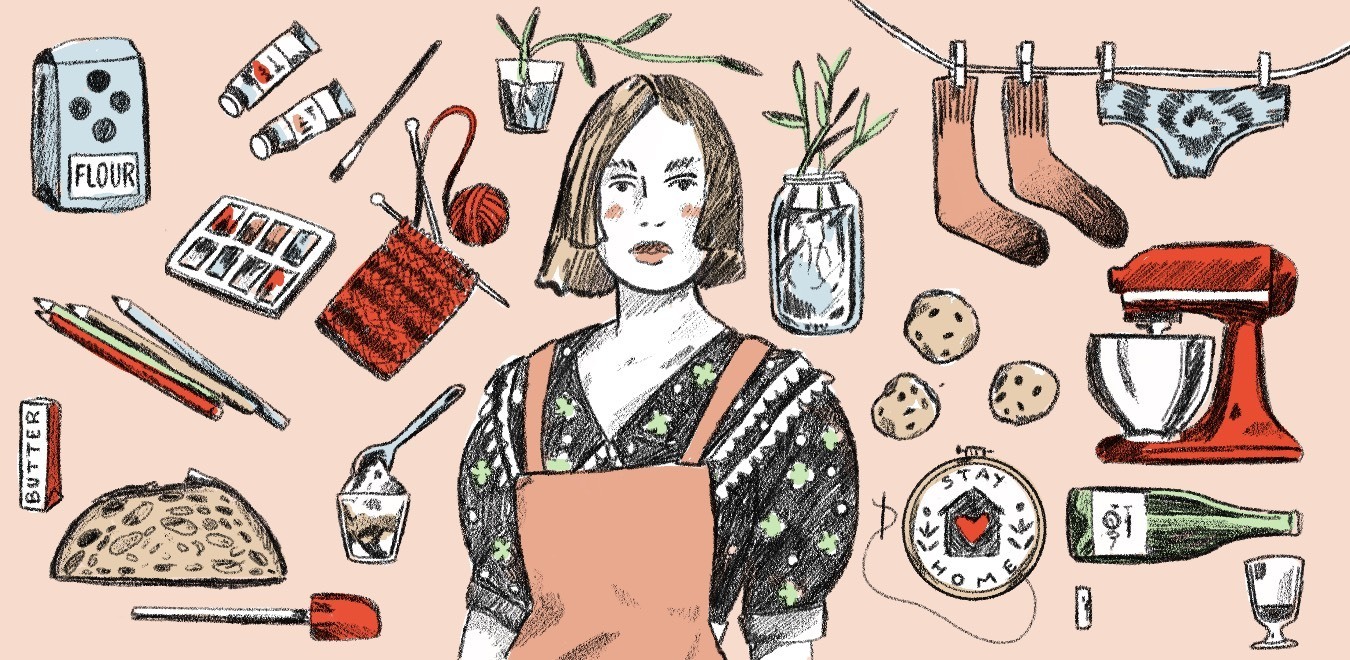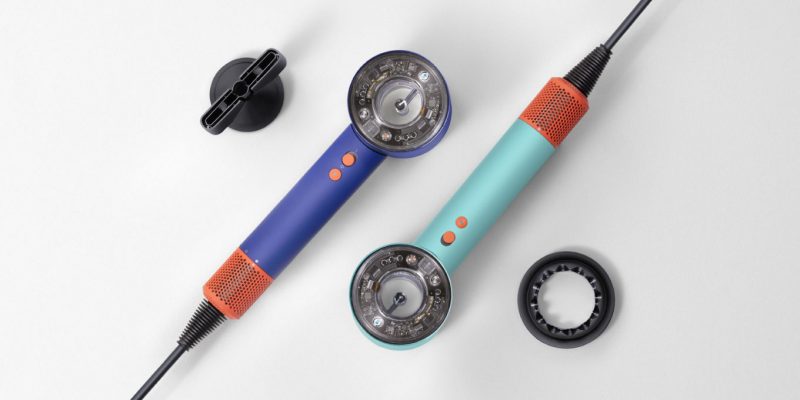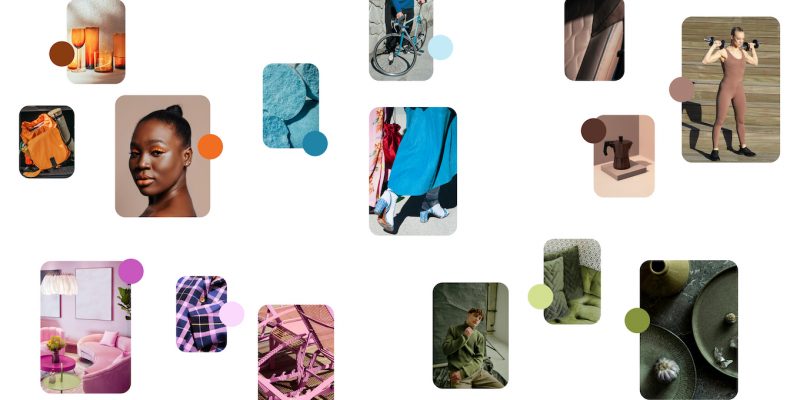Society
Why I Refuse to Be a Pandemic Pioneer
And, no, that was not an invitation to DM me about your sourdough starter.
by : Olivia Stren- Apr 23rd, 2020

Madison Van Rijn
As soon as the COVID-19 pandemic demanded we all stay home, it seemed as if everyone took to social media to post photos of their newfound hobbies. My friends and colleagues were suddenly darning socks, musing about the relative effervescence of their artisanal sourdough starter, crafting lavender candles and confecting “nature soup” out of blossoms and twigs with their flower-crowned children. As I write this, I can hear the sound of wood being chopped as my neighbours hew toys out of lumber for their two young children.
If the past month has been largely defined by scarcity and absence – a systematic deletion of freedom, safety, amenities, childcare and hope in the name of curve-flattening – it makes sense that we should turn to creation. We’ll do anything to fill and furnish the void, to assert some semblance of usefulness in a season of chaos and helplessness. What struck me most about all this panicked sock-darning was not the motivation, but rather the velocity at which the pandemic turned people into pioneers – as if we’ve all just been waiting for a collective trauma to shape-shift into Laura Ingalls Wilder.
This shouldn’t have come as a total shock. Though pandemic pioneers are now colonizing Instagram, there have been survivalist-chic rumblings for years. In hyper-hipster capitals like Williamsburg and L.A.’s Silver Lake, women have long been wearing pie-crust-collared gingham dresses, adopting hens and making their own pistachio milk – all in a curtsy to the fantasy of a Little House on the Prairie-style pastoral narrative, one that has historically found fresh fanfare in uncertain times. “At its heart, ‘Little House’ is a fantasy of total control and total isolation,” wrote author Heather Havrilesky in a 2012 New York Times piece titled “How to Be a Pioneer Woman Without Ever Leaving the Couch.” But I’ve learned in these days, weeks and months that total isolation without “total control” doesn’t have quite the same romance. So, in the face of end-of-the-world overwhelm, we’re snuggling up to the guardrails and clear-cut directions of a cake recipe, asserting a crumb of control by parenting an avocado pit or tenderly monitoring the progress of oven-gilded dough. Attempting to churn butter or nurture levain of one’s own during a time of global pestilence provides comfort and escape from a perilous present. So many people have been baking their feelings lately that there’s a dearth of flour and yeast supplies, reported the Washington Post, both online and in U.S. grocery-store aisles. Evidently, everyone who was gluten-intolerant last month is now a boulanger manqué, proofing yeast and signing up for online sourdough tutorials.
When I shared this observation with a friend over text, the ping of her phone interrupted her – she was in the middle of online shopping for seedlings on Amazon. Another friend of mine, a TV producer and mother of two young children, told me that she had recently bemoaned the wretched state of both her household and the world to a neighbour, expecting some degree of commiseration. Instead, the neighbour cheerfully proposed: “Why don’t you buy some manure so you can plant daffodils with the kids?”
“If the past month has been largely defined by scarcity and absence, it makes sense that we should turn to creation.”
I have nothing against silver linings – or daffodils – but there is nothing more irritating than people grasping for them too hastily and insisting on adhering them to your nightmare. I’d like to feel hopeful; I wish I could summon the Pollyanna-ish talent to give our collective grief a hall pass by reframing this situation as an opportunity to, say, make tea towels out of hemp. But, if I’ve learned anything these past few weeks, it’s that I don’t come from glass-half-full pioneer stock. Instead of learning how to make the best of a bad situation, I’ve learned that a good situation can easily devolve into tragedy. My mother is French, after all, which is not, stereotypically speaking, a culture celebrated for its optimism. In English, every cloud has a silver lining, but in French, “Il n’est point de bonheur sans nuage” – there is no happiness without its cloud.
An abundance of clouds – a time of crisis – reveals a person’s character, goes the truism in every language. It has been revealed that I lack the skill to embroider a silver lining on a sorrow, that I can’t sew or darn, that I have never brined or pickled or preserved, that I have never baked bread or confected dolls out of corn husks and pipe cleaners. Though I have probably panic-baked more banana bread in the past month than I have in the past four decades, perpetually checking in on the advancing complexion of my bananas like a nurse checking on her patients, I’m not tempted to embark on the kind of ambitious, performative project that will take 16 hours to complete and result in disappointment. In fact, the other day, as others were surely needlepointing by the hearth, my five-year-old son sat in the tender glow of his iPad and I sat brined in my own feelings of guilt and inadequacy, scrolling Instagram. A woman had just posted a picture of her recent pandemic baking project: cookies with icing shaped according to the lunar cycle, presumably so her kids could snack while musing about the mysteries of the Milky Way. I had my own musing: It’s miraculous how quickly – just one look at a waxing-gibbous-moon biscuit – one can feel like a failure. Even faster, as it turns out, than one can turn into homesteader.
“If I’ve learned anything these past few weeks, it’s that I don’t come from glass-half-full pioneer stock.”
Either way, what has been a disaster for the world has been a boon for the baguette. The rebirth of bread makes me think of a lunch I had at a restaurant over a month ago – the Last Lunch, as it were. I ordered a salad, and the waitress asked me gingerly: “Would you like some bread with it? It comes with sliced sourdough.” I nodded, not appreciating the joy and privilege of communicating with a charming stranger in a non-distanced fashion. She looked surprised. “Oh! Most people say no!” Little did that oft-rejected sourdough know that its celebrity was about to spike.
I have always loved bread, and so I’m happy for its revival – but I will not be baking it while trapped in isolation. How could I find the time, what with despair and anguish over the state of the world and guilt over improperly home-schooling my five-year-old keeping me so busy? The pressure to home-school our children, to keep our careers afloat, remain relatively sane and solvent now provides, if nothing else, a rich opportunity to cultivate ever-deepening feelings of failure. A very successful and efficient friend of mine recently posted footage of her young children obediently playing Brahms and learning Mandarin, their home-schooling schedule mapped in a rainbow of colours with all the intricacy and precision of an Alan Turing code. Meanwhile, in my home, our schedule has remained a vast and undisciplined expanse, one as free and wild as, well, a flower-flecked prairie. Maybe I have some pioneer in me after all.
READ MORE:
What If We Responded to Climate Change Like We Have to Coronavirus?
Newsletter
Join our mailing list for the latest and biggest in fashion trends, beauty, culture and celebrity.
Read Next

Beauty
Dyson Just Launched Its Most Intelligent Hair Dryer Yet
Get ready to upgrade your blowout game.
by : Lauren Knowles- Apr 25th, 2024

Fashion
Meredith Shaw and Penn Have Created a Plus-Size Summer Dress Collection That "Feels Like Candy"
Morning Show Host Meredith Shaw wants you to "see your summer" in this curated collection for sizes 14-32.
by : Allie Turner- Apr 25th, 2024

Culture
ELLE Escapes: Savannah
Where to go, stay, eat and drink in “the Hostess City of the South.”
by : ELLE- Apr 15th, 2024




